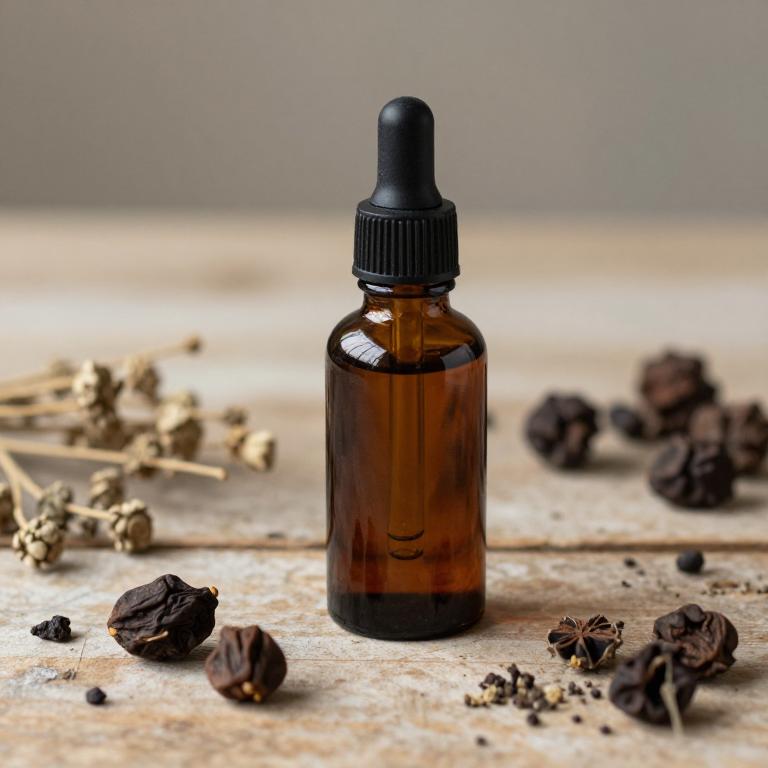10 Best Herbal Tinctures For Vomiting

Herbal tinctures for vomiting are concentrated liquid extracts made from various medicinal plants, often used to alleviate nausea and motion sickness.
Common herbs used in these tinctures include ginger, peppermint, and licorice root, which are known for their soothing and anti-emetic properties. These tinctures are typically prepared by soaking the dried herbs in alcohol or a mixture of alcohol and water, allowing the active compounds to be extracted. They can be taken orally in small doses to help settle the stomach and reduce feelings of nausea.
While generally considered safe for most people, it is advisable to consult a healthcare professional before use, especially for those with existing medical conditions or who are taking other medications.
Table of Contents
- 1. Ceylon cinnamon (Cinnamomum verum)
- 2. Ginger (Zingiber officinale)
- 3. Black pepper (Piper nigrum)
- 4. Cumin (Cuminum cyminum)
- 5. Licorice (Glycyrrhiza glabra)
- 6. Fennel (Foeniculum vulgare)
- 7. Chaste tree (Vitex agnus-castus)
- 8. Peppermint (Mentha piperita)
- 9. Dill (Anethum graveolens)
- 10. Wormwood (Artemisia absinthium)
1. Ceylon cinnamon (Cinnamomum verum)

Cinnamomum verum, commonly known as true cinnamon, has been traditionally used in herbal medicine for its potential soothing effects on the digestive system.
When prepared as a tincture, Cinnamomum verum may help alleviate symptoms of vomiting by reducing nausea and calming gastrointestinal irritation. The active compounds in cinnamon, such as cinnamaldehyde and eugenol, are believed to have antimicrobial and anti-inflammatory properties that support digestive health. However, it is important to consult a healthcare professional before using cinnamon tinctures, especially for persistent or severe vomiting, as it may interact with certain medications or conditions.
While some people find relief from mild nausea with cinnamon tinctures, they should not replace medical treatment for serious digestive issues.
2. Ginger (Zingiber officinale)

Zingiber officinale, commonly known as ginger, has been traditionally used for its anti-emetic properties, making it a popular ingredient in herbal tinctures for the treatment of vomiting.
These tinctures are typically prepared by steeping fresh or dried ginger root in alcohol, which helps extract its active compounds such as gingerols and shogaols. The effectiveness of ginger in alleviating nausea and vomiting is supported by numerous studies, which suggest its ability to reduce gastrointestinal inflammation and stimulate digestive processes. Herbal tinctures containing zingiber officinale are often preferred for their potency and ease of administration compared to raw ginger.
However, individuals with certain medical conditions or those taking medications should consult a healthcare provider before using these tinctures.
3. Black pepper (Piper nigrum)

Piper nigrum, commonly known as black pepper, has been traditionally used in herbal medicine for its digestive properties, and its tincture may be employed to address symptoms of vomiting.
The active compound in black pepper, piperine, is believed to enhance digestive enzymes and stimulate gastric secretions, which can help alleviate nausea and reduce the frequency of vomiting. However, it is important to note that while some anecdotal evidence suggests its use for gastrointestinal discomfort, there is limited scientific research supporting its efficacy specifically for vomiting. Piper nigrum tinctures should be used with caution, as they may interact with certain medications or exacerbate stomach irritation in some individuals.
As with any herbal remedy, it is advisable to consult a healthcare professional before using piper nigrum tinctures, especially for persistent or severe vomiting.
4. Cumin (Cuminum cyminum)

Cuminum cyminum, commonly known as cumin, has been traditionally used in herbal medicine for its digestive properties, including its potential to alleviate vomiting.
Cumin seed tinctures are often prepared by soaking the seeds in alcohol to extract their essential oils and active compounds, which may help settle the stomach and reduce nausea. The essential oils in cumin, such as limonene and cineole, are believed to have carminative and antiemetic effects, making them useful in managing symptoms of vomiting. While some studies suggest that cumin may help with digestion and nausea, more research is needed to confirm its efficacy as a treatment for vomiting.
As with any herbal remedy, it is advisable to consult a healthcare professional before using cumin tinctures, especially for persistent or severe vomiting.
5. Licorice (Glycyrrhiza glabra)

Glycyrrhiza glabra, commonly known as licorice root, has been traditionally used in herbal medicine for its antiemetic properties, making it a potential remedy for vomiting.
The tinctures derived from this plant contain compounds like glycyrrhizin and flavonoids, which may help soothe the gastrointestinal tract and reduce nausea. In some traditional systems of medicine, such as Chinese and Ayurvedic practices, licorice root tinctures are used to calm the stomach and ease symptoms of vomiting. However, long-term use of licorice tinctures can lead to side effects such as hypertension and electrolyte imbalances due to its mineralocorticoid-like effects.
It is important to consult a healthcare professional before using licorice root tinctures, especially for prolonged periods or in individuals with preexisting health conditions.
6. Fennel (Foeniculum vulgare)

Foeniculum vulgare, commonly known as fennel, has been traditionally used in herbal medicine for its calming and digestive properties.
Fennel tinctures are often prepared by soaking the dried seeds in alcohol to extract their active compounds, including anethole, which is believed to aid in reducing nausea and vomiting. These tinctures are commonly used in homeopathic and herbal remedies to soothe gastrointestinal discomfort and ease symptoms of motion sickness or morning sickness. The antispasmodic and carminative effects of fennel may help relax the stomach muscles and reduce the urge to vomit.
However, it is important to consult a healthcare professional before using fennel tinctures, especially during pregnancy or for individuals with chronic health conditions.
7. Chaste tree (Vitex agnus-castus)

Vitex agnus-castus, commonly known as chasteberry, is often used in herbal medicine to support hormonal balance and alleviate symptoms related to menstruation and menopause.
While it is more frequently associated with regulating menstrual cycles and reducing breast tenderness, some traditional uses suggest it may help with nausea and vomiting, particularly in women experiencing hormonal fluctuations. However, there is limited clinical evidence specifically supporting its efficacy for vomiting, and its use for this purpose remains largely anecdotal. As with any herbal remedy, it is important to consult a healthcare provider before use, especially for individuals with pre-existing conditions or those taking other medications.
Despite its traditional applications, more research is needed to fully understand its effects on gastrointestinal symptoms like vomiting.
8. Peppermint (Mentha piperita)

Mentha piperita, commonly known as peppermint, is often used in herbal tinctures to help alleviate symptoms of vomiting.
The essential oils found in peppermint, particularly menthol, have soothing and antispasmodic properties that can ease gastrointestinal discomfort. When prepared as a tincture, peppermint is typically diluted in alcohol to make it safe for consumption. This form of mentha piperita is believed to help reduce nausea and settle the stomach by relaxing the muscles of the digestive tract.
However, it is important to consult with a healthcare professional before using peppermint tinctures, especially for prolonged use or in individuals with certain medical conditions.
9. Dill (Anethum graveolens)

Anethum graveolens, commonly known as star anise, is a traditional herbal remedy that has been used for centuries to address digestive issues, including vomiting.
Its tinctures are typically prepared by soaking the dried fruit in alcohol to extract its active compounds, such as shikimic acid and essential oils, which are believed to have antiemetic properties. In traditional Chinese medicine and other herbal systems, star anise tinctures are often used to soothe the stomach and reduce nausea, making them a popular choice for digestive ailments. However, it is important to consult a healthcare professional before using star anise tinctures, as they may interact with certain medications or be contraindicated in specific health conditions.
Despite its historical use, modern scientific research on the efficacy of star anise for vomiting is limited, highlighting the need for further clinical studies.
10. Wormwood (Artemisia absinthium)

Artemisia absinthium, commonly known as wormwood, has been traditionally used in herbal medicine for its potential to alleviate symptoms of vomiting.
When prepared as a tincture, artemisia absinthium is often diluted with alcohol to create a concentrated herbal extract that can be taken internally. This tincture is believed to act on the digestive system, helping to reduce nausea and induce vomiting in cases of poisoning or severe illness. However, it is important to note that artemisia absinthium contains compounds like thujone, which can be toxic in high doses and may cause adverse effects.
Therefore, it should only be used under the guidance of a qualified herbalist or healthcare professional.